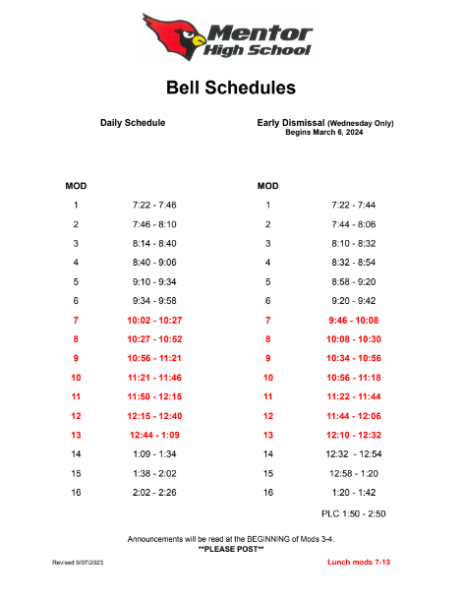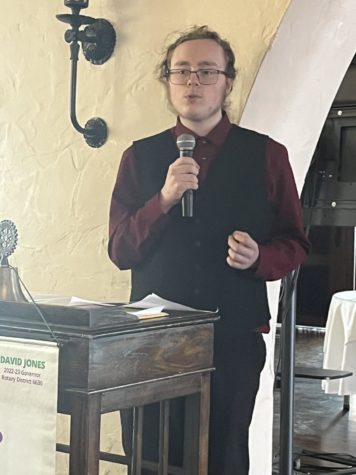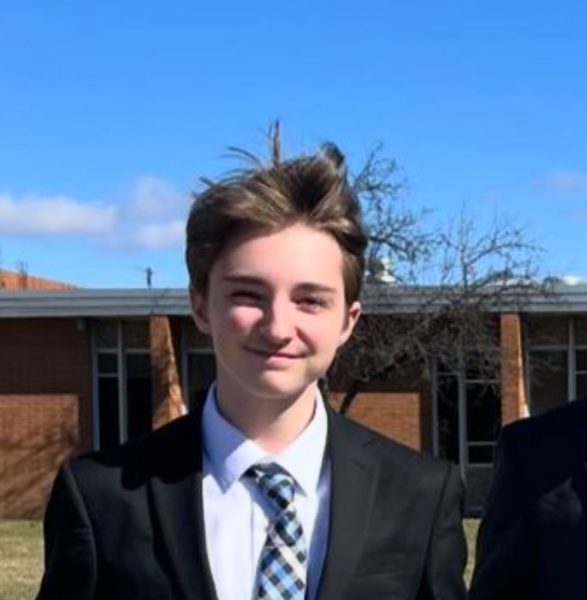Beginning on March 6, the schedule of Wednesdays at Mentor High School is set to change. From being able to arrive at school almost an hour later than usual, students will now be dismissed an hour early. For some, this change brings relief, as students can enjoy a lengthened afternoon at their pleasure. For others, the switch cuts short their relished mid-week sleep-in.

A change made by Mr. Jason Crowe, Principal of Mentor High School, and other administrators, the switch was enacted in an attempt to limit the number of tardy students and allow for learning collaboration among students and teachers. In the announcement email sent to all students, educators, and parents, Mr. Crowe reported that 156% more students were tardy to their first classes on a late-start Wednesday than on a normal day throughout the week.
Further, he offered potential benefits, noting that Professional Learning Communities (PLCs) will be able to take place during the time, allowing students and educators to collaborate and enhance their educational opportunities. Mr. Crowe also suggested that the all-too-common behavioral infractions that occur in the mornings can be reduced by the switch to early dismissal.
Talking To Mentor High

To gauge the school’s opinion, Cardinal Nation reached out to a handful of students and educators. We first contacted Mr. Jason Crowe himself to provide further context on his first email to the district.
Cardinal Nation: Why was this switch introduced? Would it be possible to outline a quantitative average number of tardy students on both regular and late start days?
Mr. Crowe: The decision to have students dismissed earlier, as opposed to a late start will help address the increase of tardies and behavioral infractions that have occurred during our Late Start period while still providing our staff the opportunity for focused collaboration and training through our Professional Learning Communities (PLC’s). Looking at three recent weeks, the average number of students marked tardy to mods 1-2 was 27.9 on Monday, Tuesday, Thursday and Friday. During these weeks the average of students marked tardy to mods 1-2 on Wednesday was 50.7. This represents about an 80% increase of students marked tardy on Wednesday during these weeks.
Cardinal Nation: Why is this change being enacted now as opposed to the start of next school year?
Mr. Crowe: We wanted the opportunity to pilot it for a short period of time to see which model we prefer entering next school year.
Cardinal Nation: How will concerns regarding previously scheduled after-school clubs on Wednesday be addressed, such as the question of whether students will be expected to wait at school until teachers conclude their meetings?
Mr. Crowe: Activities meeting after school on Wednesday will need to wait until the teacher day ends at 2:50 or switch to another day of the week. Activities that are supervised by an outside employee can continue to meet at their normal time. If we continue with this model entering next school year we will communicate this early in the summer to staff, students and families to allow extracurricular activities to select a date rather than Wednesday if they would like to meet before 2:50.
Cardinal Nation: With the potential for large gatherings of students in the student center after school on Wednesdays, the possibility of fights remains. If a substantial number of these student altercations are still recorded after school on Wednesdays, will early dismissal continue to be pursued, or will the schedule be altered to address this?
Mr. Crowe: If we continue to see an increase in behavior that does not meet expectations during this time we will look to find alternative solutions to help. One such solution may be to assign students to lecture halls to keep numbers smaller in the Student Center and to provide students with another study hall.
****************************************
Voicing his support for the new change, Mr. Crowe offered the potential for benefits and drawbacks – mentioning the unknown outcome of the switch – but expressed his hope for a successful integration.
However, some students questioned the thinking behind the decisions, mainly being to reduce the number of tardy students on Wednesdays.

“I don’t think this will solve the root cause of tardiness as the kids who are already tardy on a regular basis are still going to be
tardy,” says junior Casey Gray, “The main point is you’re not solving anything by doing this.”
Looking to the future, the student body relayed their concerns regarding the period between early dismissal and when bussing occurs.
Sophomore Sonja Marich voiced concerns about the population-based impact of the new change to Cardinal Nation, saying “What if kids don’t have rides home? Then you’re just gonna have the same overcrowding problem that you did in the morning.”
Many students are put off by the decision to place teacher meetings in the time between dismissal and bussing, not allowing clubs or other activities to run during that time. Some, though, are content with the changes and are interested in seeing the outcome before taking a stance.
When reached out to, an anonymous teacher noted that she “did not mind the change” and was willing to “go with the flow” on the matter.
A Hopeful Future

However, the change offers the chance for benefits. Firstly, the new time between when students would be dismissed, and when bussing would occur, offers the chance for clubs and activities to take place, allowing students who normally would not be able to stay after school the opportunity to participate in extracurricular activities.
Casey Gray, despite voicing opposition to the switch to early-dismissal, remains hopeful that the switch can grant students access to additional opportunities, adding, “I’ve heard from multiple students, that the reason why they can’t do extracurriculars is because they don’t have a ride home [afterward]. This would provide a solution.”
Though currently, as many teachers participate in meetings during this time, changes would need to be made to facilitate this benefit.
The change to early dismissal has the potential for massive benefits but also raises some unaddressed concerns. Though some students and educators might feel negatively regarding the switch, it remains to be seen how the change will be received, and whether it will be continued into future school years.









